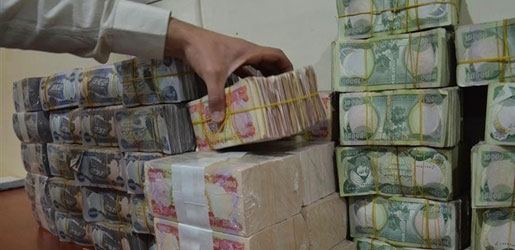An economic catastrophe. “Shocking” figures reveal the extent of Iraq’s internal debt. Where is the economy headed?
 Iraq is witnessing a sharp increase in domestic public debt levels through 2025, sparking serious debate about the sustainability of the country’s financial situation.
Iraq is witnessing a sharp increase in domestic public debt levels through 2025, sparking serious debate about the sustainability of the country’s financial situation.
The government downplays the seriousness of the situation, asserting its ability to manage this debt internally, while experts are increasingly calling for budget reform and spending cuts as a radical solution.
Data released by the Central Bank of Iraq reveals a clear jump, with domestic debt recording a new increase, reaching approximately 87.7 trillion dinars (about $66.4 billion) at the end of last June.
According to official statistics, this figure represents an increase of approximately 5.4% compared to 2024, when the domestic debt reached $62.9 billion.
This debt inflation comes amid a near-total reliance on fluctuating oil revenues, which is pushing the government toward domestic borrowing to finance the budget deficit.
Reducing the price of the dinar
Economic expert Ammar Ghassan confirmed that the decision to devalue the Iraqi dinar from 1,450 to 1,310 per US dollar has brought about structural changes in the country’s public finances, most notably an increase in government expenditures and a worsening fiscal deficit.
Ghassan said that this decision increased government spending by about $25 billion annually, leading to a jump in current expenditures from 104 trillion dinars ($78.8 billion) to 125 trillion dinars ($94.7 billion).
He also pointed out that the wage bill alone has increased from 43 trillion dinars ($32.6 billion) to 60 trillion dinars over the past two years.
According to Ghassan’s vision, the country’s rising domestic debt is due to the government’s reliance primarily on the liquidity of public and private banks to finance its domestic and external obligations. This has depleted these banks’ resources and negatively impacted overall economic activity.
Multiple negative repercussions on economic performance
Ghassan warned of the negative repercussions of this situation, which he summarized in the following points:
*Weak monetary policy instruments and their impact on prices: A change in fiscal policy may limit the effectiveness of the central bank’s instruments, raising inflation if there is no coordination between monetary and fiscal policies.
*Worsening budget deficit: Increased government spending increases the burden on the budget and deepens the actual deficit.
*Negative impact on economic growth: Investment in government debt instruments becomes more attractive to the banking sector than lending to the private sector, which hinders credit expansion and impacts growth.
*Erosion of the real value of government financial assets, which reduces the government’s ability to meet its future obligations.
*Increasing domestic debt service burdens could negatively impact citizens’ standard of living, especially if the government is forced to cut social spending necessary to combat poverty and unemployment.
*Deepening economic rentierism through excessive operational spending and neglecting investment in strategic economic activities.
Government assurances
For his part, the Iraqi Prime Minister’s financial advisor, Mazhar Mohammed Salih, affirmed Iraq’s strong financial position and its high capacity to manage its external and internal debts.
Saleh said that the total outstanding external debt is less than $20 billion, half of which is due by 2028. He emphasized that the government allocates specific annual spending lines to service it.
He added, “Iraq has never defaulted on its debt payments,” stressing that “our country’s standing with external creditors enjoys a positive and positive reputation.”
Regarding domestic public debt, Saleh indicated that it is held exclusively by the government banking system, explaining that less than half of it is currently managed by the Central Bank’s investment portfolio with high technical and financial capacity.
“There’s no need to worry,” he said, as monetary and fiscal policies are working to develop innovative repayment mechanisms, including converting debt into investment rights in productive projects within an integrated national fund. He added, “Our country enjoys enormous economic wealth that undoubtedly exceeds these debts.”
New structure to diversify revenues
For his part, economic advisor Alaa Al-Fahd affirmed that there is a fundamental shift in the financial management structure of the Iraqi economy, focused on attracting investment and creating a suitable investment environment.
Al-Fahd explained that the government, as part of its reform program, seeks to diversify sources of income and reduce reliance on foreign loans, while also bridging the financial deficit through domestic borrowing and the issuance of government bonds.
Al-Fahd stressed that investment is the primary driver of reducing dependence on oil, emphasizing the importance of revitalizing the investment sector by attracting foreign investment and implementing banking reforms to create credit strength.
For his part, economic expert Hassan Sheikh Zeini emphasized that domestic debt poses less of a risk than external debt, noting that its increase was a direct result of the decline in oil prices.
He said that the state’s resort to public debt to cover the deficit was a response to insufficient oil revenues, stressing that reducing external debt is an inevitable step to maintain high creditor confidence and avoid international court proceedings.
The economic expert proposed solutions to address the country’s ballooning domestic debt and reliance on oil (oil constitutes 95% of revenues), describing it as a “strategic mistake,” the most important of which are:
*Reducing operating expenses and implementing a fair salary scale.
*Diversifying liquidity sources through productive investment projects instead of over-reliance on taxes and fees.
*Combating corruption in revenues and imposing e-governance on taxes and services to ensure that funds go to the state treasury.
Sheikh Zini emphasized that Iraq’s external debt poses the greatest threat to its reputation and the confidence of international countries and banks in it. Therefore, the speaker added, increasing the internal debt while reducing the external debt places Iraq in a position of trust with international creditors.
Burathanews.com
